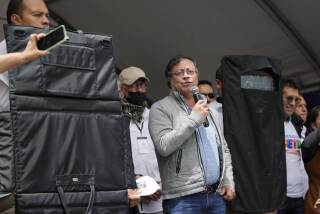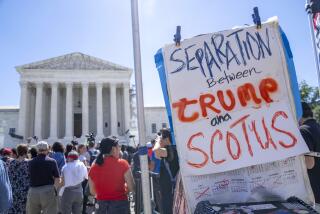President Won’t Halt Marcos Case : Reagan’s Reported Decision Clears Way for Indictment
WASHINGTON — President Reagan will not intervene to prevent the indictment of former Philippine President Ferdinand E. Marcos, government sources said Wednesday, apparently clearing the way for a federal grand jury in New York to act on fraud and conspiracy allegations against him.
The President decided that he “will not prevent the law from taking its course,” despite the potential diplomatic consequences of action against a former head of state, an Administration source said.
Action by the grand jury is expected soon, sources said.
In another development, a federal appeals court in New York on Wednesday upheld a civil contempt ruling against Marcos for failing to turn over subpoenaed evidence to the grand jury. A bench warrant was issued for Marcos’ arrest, although he is not expected to be taken into custody immediately.
Diversion of Funds
The Manhattan grand jury has been investigating allegations that Marcos diverted for his own use large sums of Philippine government funds and U.S. aid money to the Asian nation. The White House decision not to intervene, sources said, was based on evidence indicating that the alleged illegal activity continued after Marcos took refuge in the United States in 1986 at Reagan’s personal invitation.
The final preparation for possible criminal action began earlier this week when a team of Justice and State Department officials briefed Philippine President Corazon Aquino on the White House decision, sources confirmed.
The grand jury investigating Marcos is scheduled to reconvene today, but it was not clear whether any action naming Marcos and his wife, Imelda, would be announced. Sources said prosecutors are considering keeping any action sealed, possibly to permit more time for plea-bargaining discussions.
State Department Pressure
The Times disclosed last week that the State Department was pressing federal prosecutors to offer Marcos a chance to negotiate a plea agreement before any indictment was issued. However, the Justice Department had argued that negotiations should begin only after an indictment. Top Justice Department officials met with the Marcoses’ lawyers earlier this week, but sources said there were no formal settlement talks.
A sealed, or secret, indictment also would allow prosecutors time to locate others accused of wrongdoing in the case. A number of Marcos associates linked to the investigation are known to be living outside the United States, and some are believed to have been named in grand jury actions that sources said were issued under seal last week.
The U.S. 2nd Circuit Court of Appeals in New York, in upholding the civil contempt finding against the Marcoses, provided the most detailed glimpse yet of the prosecution’s case against the deposed dictator.
The opinion by the three-judge panel disclosed that federal prosecutors believe the Marcoses and their associates “fraudulently diverted enormous sums of money that belonged to the Philippine government and the government of the United States . . . intended for the benefit of the Philippine people.”
Among other things, the ruling said, the couple is alleged to have used funds embezzled in both the Philippines and the United States to buy real estate in New York and other personal property. Some funds, according to the court, allegedly were transferred to secret Swiss bank accounts held by the Marcoses.
Khashoggi Deals Probed
The Times reported last June that the grand jury investigation also focuses on allegations that the Marcoses conspired with Saudi Arabian financier Adnan A. Khashoggi and others to conceal their ownership of property and to transfer assets to front companies in violation of U.S. court injunctions.
Sources said investigators have examined real estate documents allegedly backdated in 1986 to make it appear that Khashoggi had bought various New York office buildings in 1984. Such backdating would make it appear that the transactions, allegedly funded by the Marcoses, occurred before the Philippine revolution and before a court-ordered freeze on the Marcoses’ holdings.
Last April, the grand jury issued subpoenas ordering the Marcoses to submit fingerprints, palm prints and voice and handwriting samples. In July, subpoenas also were issued ordering them to authorize their banks to release their financial records.
Marcos refused, arguing that he and his wife were immune because he was a head of state formally granted refuge in the United States.
The White House was concerned about the possible diplomatic reaction to a U.S. criminal indictment of the leader of an allied nation who was invited into this country.
But White House apprehension was substantially reduced, sources said, when the Aquino government agreed to grant a formal waiver of its former president’s head-of-state immunity--a waiver sought by the State Department.
Court Rejects Claim
The appeals court rejected Marcos’ legal claim of immunity.
“The Marcoses have been stripped of their positions of power as rulers of the Philippines,” the 22-page opinion said, adding that to rule in favor of the former dictator “would serve simply to embarrass the current Philippine government by allowing its former rulers, who allegedly embezzled huge sums of money from the Philippines, to add insult to injury by claiming immunity in the name of that government.”
In Honolulu, Marcos spokesman Gemmo Trinidad said he had no information about the ruling and could not comment. Marcos’ associates previously have told The Times that he would regard an indictment as “a personal betrayal” by Reagan.
Times staff writer John J. Goldman, in New York, contributed to this story.
More to Read
Sign up for Essential California
The most important California stories and recommendations in your inbox every morning.
You may occasionally receive promotional content from the Los Angeles Times.










